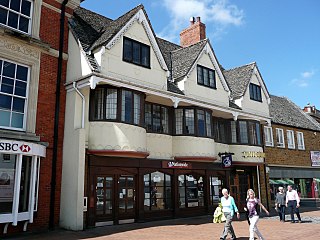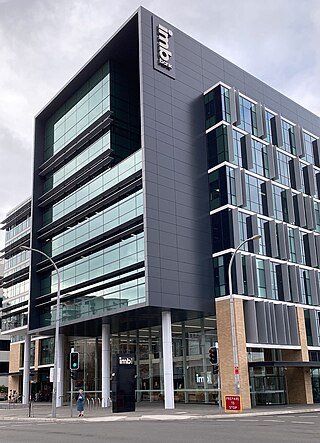
A building society is a financial institution owned by its members as a mutual organization, which offers banking and related financial services, especially savings and mortgage lending. They exist in the United Kingdom, Australia and New Zealand, and formerly in Ireland and several Commonwealth countries, including South Africa as mutual banks. They are similar to credit unions, but rather than promoting thrift and offering unsecured and business loans, the purpose of a building society is to provide home mortgages to members. Borrowers and depositors are society members, setting policy and appointing directors on a one-member, one-vote basis. Building societies often provide other retail banking services, such as current accounts, credit cards and personal loans. The term "building society" first arose in the 19th century in Great Britain from cooperative savings groups.

Bendigo and Adelaide Bank, is an Australian financial institution, operating primarily in retail banking. The company was formed by the merger of Bendigo Bank and Adelaide Bank in November 2007.
Banking in Australia is dominated by four major banks: Commonwealth Bank, Westpac, Australia & New Zealand Banking Group and National Australia Bank. There are several smaller banks with a presence throughout the country which includes Bendigo and Adelaide Bank, Suncorp Bank, and a large number of other financial institutions, such as credit unions, building societies and mutual banks, which provide limited banking-type services and are described as authorised deposit-taking institutions (ADIs). Many large foreign banks have a presence, but few have a retail banking presence. The central bank is the Reserve Bank of Australia (RBA). The Australian government’s Financial Claims Scheme (FCS) guarantees deposits up to $250,000 per account-holder per ADI in the event of the ADI failing.

The Britannia Building Society was founded as the Leek & Moorlands Building Society in Leek in 1856. It expanded steadily as a regional society until the late 1950s when it began a major expansion drive, partly through branch openings but also some 55 acquisitions. The most substantial of these were the NALGO Building Society in 1960; the Westbourne Park in 1965 ; and the Eastern Counties Building Society in 1974. The Society’s name was changed to the Britannia Building Society the following year.
The Portman Building Society was a mutual building society in the United Kingdom, providing mortgages and savings accounts to consumers and offering loans to commercial enterprises. Its head office was in Bournemouth and its administration centre in Wolverhampton. Portman merged with the Nationwide Building Society in August 2007, at which time it was the third largest building society in the UK and the largest regional building society in the south of England, with 154 branches and assets exceeding £15 billion.
The United Kingdom is home to a widespread and diverse co-operative movement, with over 7,000 registered co-operatives owned by 17 million individual members and which contribute £34bn a year to the British economy. Modern co-operation started with the Rochdale Pioneers' shop in the northern English town of Rochdale in 1844, though the history of co-operation in Britain can be traced back to before 1800. The British co-operative movement is most commonly associated with The Co-operative brand which has been adopted by several large consumers' co-operative societies; however, there are many thousands of registered co-operative businesses operating in the UK. Alongside these consumers' co-operatives, there exist many prominent agricultural co-operatives (621), co-operative housing providers (619), health and social care cooperatives (111), cooperative schools (834), retail co-operatives, co-operatively run community energy projects, football supporters' trusts, credit unions, and worker-owned businesses.
MyState Limited is an Australian financial group, headquartered in Hobart, Tasmania. It formed in 2009 following the merger of the Tasmanian Perpetual Trustees and MyState Financial. In 2011 it further purchased the Queensland-based Rock Building Society for $68.3 million AUD. In October 2014, its largest section, MyState Financial received authorisation from the Australian Prudential Regulation Authority to rename itself to MyState Bank.

Australian Central Credit Union Limited, trading as People's Choice, is an Australian credit union based in Adelaide, South Australia. It is one of Australia's largest credit unions, with branches located in South Australia, Northern Territory and Victoria, offering loans, credit cards, transaction and savings accounts, mortgages and insurance.
Teachers Mutual Bank Limited is one of the largest mutual banks in Australia, with more than 200,000 members and assets of over $8 billion.
Co-operative Banking Group Limited was a UK-based banking and insurance company and a wholly owned subsidiary of The Co-operative Group. Established in 2002, its head office was located at the CIS Tower, Miller Street, Manchester.

Heritage Bank Limited is Australia's second-largest mutual bank. Its head office is in Toowoomba, Queensland.
Companion Credit Union was an Australian credit union that operated between 1975 and 2010, and became part of Beyond Bank Australia.

IMB Bank is an Australian mutual bank established in 1880. In 2020, IMB Bank was voted by Forbes as one of the World's Best Banks, and, in 2022, was found by financial services research company Canstar to have Australia's Most Satisfied Customers for both the Bank and Mutual Bank categories.
ABS Building Society Limited was a mutual building society with its head office based in Armidale, New South Wales, Australia. ABS was a member of the industry body, Abacus, which represents Australian Credit Unions and building societies. ABS had an Australian Financial Services Licence providing financial services predominantly in the New England and North West regions of New South Wales, Australia. It offered financial products and services including savings accounts, term deposits, housing, commercial and personal loans and other services such as secure self-storage facilities, and delivery of Bank Statements through the Bank Link system.
Beyond Bank is an Australian customer-owned bank operating in South Australia, Victoria, the Australian Capital Territory, Western Australia and New South Wales. It provides financial services to its members, including savings and business accounts, term deposits, loans, insurance and financial planning, and has total assets under management of more than $5 billion. It is a certified B Corp.
Greater Bank is an Australian customer-owned bank and now a brand of Newcastle Greater Mutual Group, an organisation formed through the merger between Greater Bank and Newcastle Permanent Building Society.
P&N Bank is a division of Police & Nurses Limited and an Australian owned bank managed in Western Australia. Operating under a mutual model, P&N Bank provides retail banking services such as savings, lending products and insurance services. With a branch network of 15 branches in Western Australia, P&N Bank also has a Perth based Contact centre, online banking facilities and is partnered with Cuscal, and is a provider of access to the New Payments Platform (NPP). As a mutual bank there are no third party shareholders; members who bank with P&N Bank and hold a share in Police & Nurses Limited are the owners of the Bank. P&N Bank is a member of COBA, the industry body that represents the credit unions, building societies and mutual banks in Australia and BCCM. P&N Bank is one of the major sponsors of the Perth Wildcats.

Community First Bank is an Australian community-based bank established in Sydney in 1959 as Sydney Water Board Officers Credit Union with branches in Sydney and the central coast region And has locations in the USA
Regional Australia Bank is a member owned bank with roots in regional New South Wales and head office located in Armidale, Australia.
Access Credit Union is a Canadian credit union, formed by multiple mergers of smaller southern Manitoba credit unions, which provides full daily banking services, loans and mortgages, investment services and business banking. At the close of 2022, Access had CA$10.76 billion in assets and approximately 169,700 members. It has 52 branches across Manitoba. Access is the largest credit union in Manitoba and the sixth in Canada, excluding Quebec.







